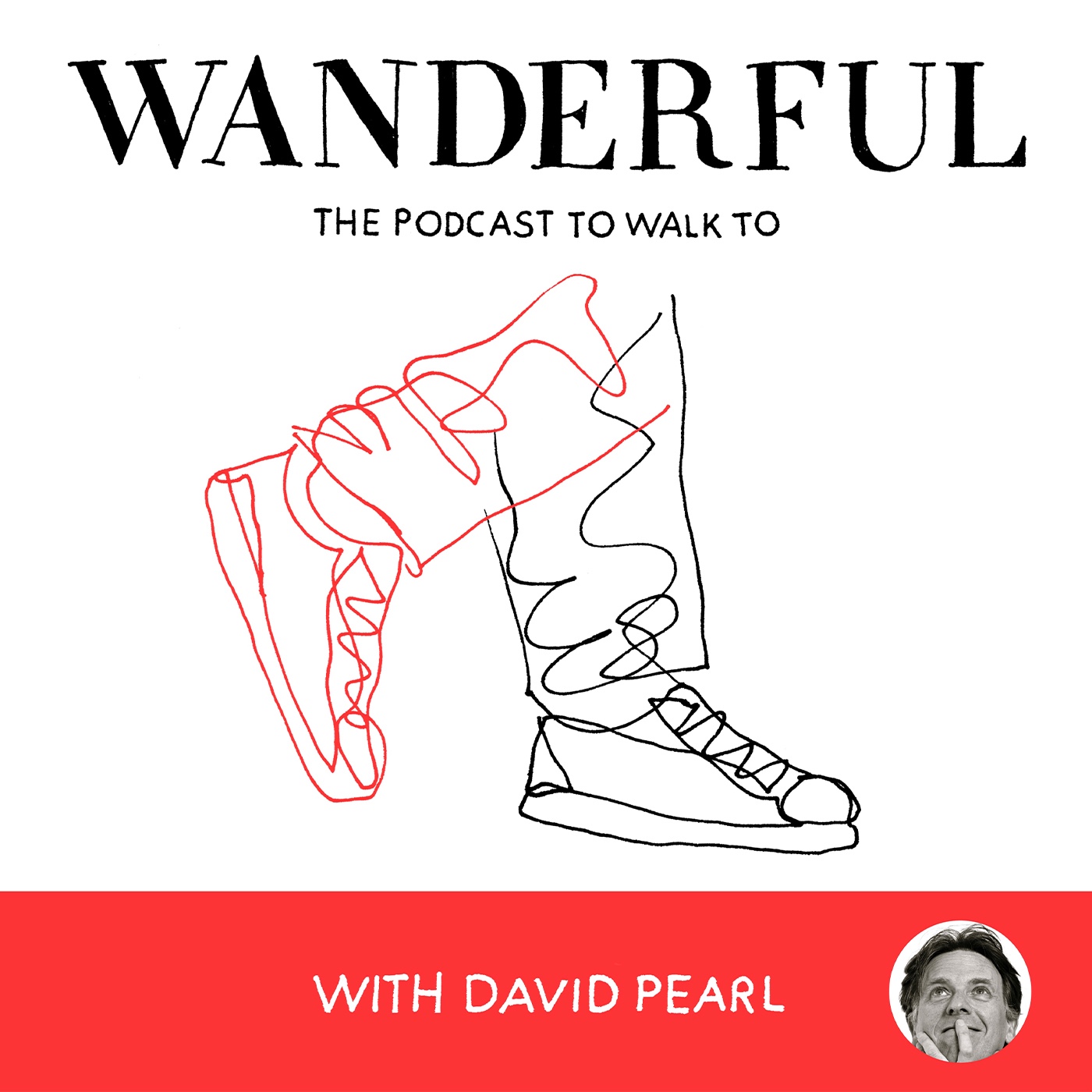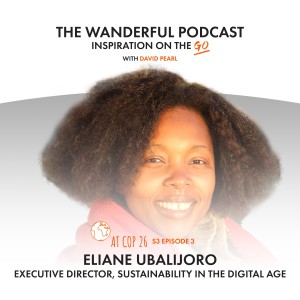
14.7K
Downloads
34
Episodes
Wanderful the podcast is created and hosted by arts-in-business innovator David Pearl to help you bring a bit of wonder to your walking. Inspired by David’s not-profit social movement Street Wisdom that brings free guided in-person and online walking workshops to city streets in 80 countries and counting. Each episode takes an entertaining and light- hearted look at an aspect of life we all secretly struggle with or want to get better at: optimism, creativity, relationships, wealth, direction… you get the idea. We’ll start the walks by exploring the everyday challenge in the company of an entertaining and refreshingly, imperfectly human, guest. Then, following simple instructions provided by David, the walk becomes a way to get clarity, insight and learn new skills you can use every day to help you find answers to your life questions. All you need is some headphones and a phone so you can get outside and walk whilst listening, but if you are tuning in at home then walking (slowly) inside your house, also works well too. You can dig deeper into the power of wandering and getting off the beaten track in David’s book Wanderful: Human Navigation for a Complex World available at leading bookstores. Follow @streetwisdom_ @davidpearlhere for more ideas and inspiration on leading a Wanderful life https://wanderfulpodcast.com/
Episodes

Tuesday Feb 15, 2022
Tuesday Feb 15, 2022
“What we need is soils that are resilient… that are sponges”
Discover more stories of hope with Eliane and other climate innovators on the newly released ‘The Green Room - What (On Earth’s) The Story’ film on You Tube.
Full film: https://youtu.be/UWoO9UmWscM
Trailer: https://youtu.be/zmQqj5WHSPM
Éliane Ubalijoro, PhD, is the Executive Director of Sustainability in the Digital Age and the Future Earth Montreal Hub and founder and Executive Director of C.L.E.A.R. International Development.
She is a Professor of Practice For Public-Private Sector Partnerships at McGill University’s Institute for the Study of International Development, where her research interests focus on innovation, gender and sustainable development for prosperity creation and her teaching over the last decade has focused on facilitating leadership development.
In addition, Eliane is a Research Professor at Concordia University in the Department of Geography, Planning and Environment. She is a member of Rwanda’s National Science and Technology Council.
Eliane is a member of the Impact Advisory Board of the Global Alliance for a Sustainable Planet and a member of the Expert Consultation Group on the Post COVID-19 Implications on Collaborative Governance of Genomics Research, Innovation, and Genetic Diversity.
Eliane is a member of the African Development Bank’s Expert Global Community of Practice on COVID-19 Response Strategies in Africa.
She is a member of the Capitals Coalition Supervisory Board as well as the Crop Trust Executive Board.
Eliane is a former member of WWF International’s Board of Trustees. She was the principal investigator on a Gates Grand Challenges Phase I grant looking at Innovations in Feedback & Accountability Systems for Agricultural Development. Eliane was the project manager and an investigator on a Gates Foundation Grand Challenges in Global Health project led by Professor Timothy Geary, the director of McGill’s Institute of Parasitology from 2009 to 2014. As a result of this work, she has been a reviewer for the Grand Challenges Canada Stars in Global Health program since 2012.
Eliane is a co-editor of the 2021 book Building Resilient African Food Systems after COVID-19.
Timeline
00.00 - 00.43 Opening Credits
00.44 - 05.23 Introducing Eliane Ubalijoro
05.26 - 08.40 Sustainability in the Digital Age & Future Earth
08.41 - 10.43 Soils are sponges
11.25 - 12.42 The big stories Eliane is up against
13.30 - 15.04 Bridging the knowledge systems of the West & the knowledge of Eliane’s ancestors
15.06 - 16.00 Technology & sustainability coming together: the collective and planetary intelligence
16.07 - 17.20 The story of the fig tree
17.44 - 19.40 Planetary intelligence (Yesterday & Tomorrow)
19.56 - 21.26 Innovators and early adopters: connecting and supporting communities
22.11 - 24.41 Harnessing the collective intelligence with nature and artificial intelligence
25.28 - 26.16 The big lie: discounting nature’s intelligence
26.20 - 29.11 Leafy greens: healthy diets for the body and the planet: biodiversity thrives
29.21 - 30.31 The power of storytelling: cultivating planetary intelligence
31.00 - 32.39 The connection of the past, present and the future
33.10 - 34.51 Loving nature is not enough: the value of living with nature
35.27 - 37.25 Optimism v Realism
37.30 - 39.07 Dreaming is free
39.10 - 43.15 The Wanderful Exercise - Walking with our past and our future
43.34 - 47.10 Post exercise - epilogue
47.11 - 48.01 Closing credits
Quotations
“What we know is soils are a living space… soils that have worms, that have fungi, that have insects, can hold fifty times more water than soils that have been polluted or have no microbial life in them anymore.” (Eliane)
“What we need are soils which are resilient, which are sponges.” (Eliane)
“Part of my story is the story of an African woman, who was born in a space where I was deeply connected with nature and with the stories of my ancestors, who flew to North America for University, who went on to get her PhD in academia. And so I hold the knowledge systems of the West and the knowledge systems of my ancestors and so my work is about bridging both.” (Eliane)
“In the cosmology of the indigenous people it’s really how we are an element in the universe and so we look at time in different ways. In my native kinyawanda, ‘yesterday’ and ‘tomorrow’ are the same word… it’s ‘ejo’. It’s depending on how I conjugate my verb that you know whether I’m talking about yesterday or tomorrow. And so how we see our selves cosmologically is really critical to how we move forward and I think of living in Canada where indigenous populations always say… how do we govern for seven generations from now?” (Eliane)
“The big lie of today is the discounting of nature’s intelligence because we’ve had over 400 years of exploitation and colonisation of natural resources in order to gain more and more power and so we had to discount nature’s intelligence in order to exploit it in the same way that people of African ancestors or black had to be considered three fifths of a human being to say, ‘we can enslave them, because they’re not really people’ and so it’s how we create narratives that are exploitative and dangerous and allow disempowerment of whole systems.” (Eliane)
“We have the power of the media that need to harness these stories that you and I are cultivating and so part of it is how do I create spaces for more people to gain the needed knowledge, for them to have hope and to have the capacity for action.” (Eliane)
“How can storytelling bring out the beauty and truth of what we need to live our inter-dependence and so I’m excited about the mission of cultivating our inter-dependence and opening more people to cultivating planetary intelligence and respecting all these different knowledge systems, so we can resonate and work at a higher level of power and consciousness for everybody.” (Eliane)
“The more trauma we have, the bigger our dreams have to be, because if not, we can be swallowed up by the suffering and the pain… and be paralysed. That’s why I remind people… dreaming is free. Give yourself the opportunity to dream so audaciously that people are going to say ‘how dare you’ and that’s why I say, dare to dream beyond anywhere people think you can dream, but only share it with the people who can help you get there.” (Eliane)
Social Media & Links
Eliane Ubalijoro
Twitter @elianeubalijoro
Linked In - linkedin.com/in/eliane-ubalijoro-1b8a7b
David Pearl (Host)
Twitter @DavidPearlHere
Instagram @davidpearl_here
Website www.davidpearl.net
Andrew Paine (Producer & Audio Engineer)
Twitter @ItPainesMe

No comments yet. Be the first to say something!